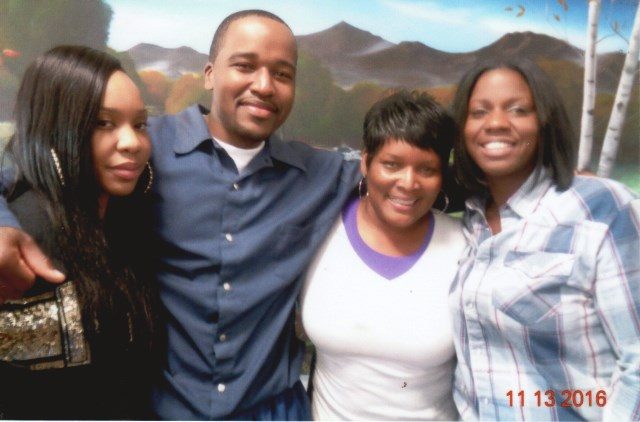
Darrell Ewing, mother LaSonya Dodson to his right, and sisters.
Hearing granted due to introduction of gang-related social media and internet research in jury deliberations
Panel calls new trial granted to Detroit killer cop Larry Nevers in similar jury deliberation issue an exception
Ewing: “I’m the ‘super- predator’ who has to go the extra mile, but either way it’s a win, win.”
Judge Cynthia Gray Hathaway would hold hearing at trial level; allowed Facebook evidence at Joseph Weekley trial for death of Aiyana Jones, 7
By Diane Bukowski
February 13, 2019
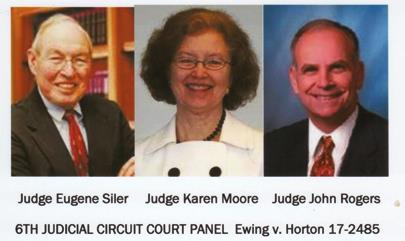 Cincinnati, Ohio – A divided Sixth Circuit Court of Appeals panel ruled Feb. 5 that Detroiter Darrell Ewing, now 30, convicted in Dec. 2010 of the first-degree murder of J.B. Watson, must be granted an evidentiary hearing originally denied by the trial court.The purpose of the hearing is to determine whether Ewing’s jury was adversely influenced by gang-related social media and other internet research two members introduced into the deliberations.
Cincinnati, Ohio – A divided Sixth Circuit Court of Appeals panel ruled Feb. 5 that Detroiter Darrell Ewing, now 30, convicted in Dec. 2010 of the first-degree murder of J.B. Watson, must be granted an evidentiary hearing originally denied by the trial court.The purpose of the hearing is to determine whether Ewing’s jury was adversely influenced by gang-related social media and other internet research two members introduced into the deliberations.
See full ruling including dissenting opinion at: http://voiceofdetroit.net/wp-content/uploads/Ewing-6th-CC-2-5-19.pdf
The Sixth Circuit reversed a Nov. 2017 ruling by U.S. District Court Judge Denise Page Hood granting Ewing a new trial instead, or that he be released within 90 days if the state did not act to do so. At issue was the length of time since the jury deliberations in 2010, and the balancing of state vs. federal authority in the case. The majority called a previous Sixth Circuit ruling ordering the release of Nevers an exception to the rule that an evidentiary hearing is the proper solution to extraneous influences on the jury
“. . .We reverse and remand to the district court with instructions to issue an amended order conditionally granting habeas relief unless the State takes steps to conduct a proper evidentiary hearing on Ewing’s claim of juror misconduct within a reasonable period set by the district court’s order,” wrote Judge John Rogers, joined by Judge Eugene Siler. “We leave it for the district court to determine whether the two additional claims presented in Ewing’s petition should be resolved before ordering relief on this claim.”
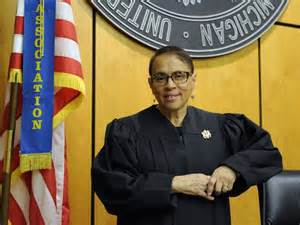
U.S. District Court Judge Denise Page Hood
Judge Page Hood had declared moot two other issues raised by Ewing. They were detailed confessions by Tyree Washington to the murder, and allegedly improper jury instructions by the trial judge. The jury had told the court it was deadlocked but was told to go back and continue deliberations. Judge Page Hood said it was evident that the extrinsic information brought into jury deliberations, which included citations from Facebook and from internet research on gang “pecking orders,” likely broke the deadlock and resulted in a guilty verdict days later.
See Judge Page Hood’s ruling at http://voiceofdetroit.net/wp-content/uploads/Darrell-Ewing-habeas-corpus-grant.pdf.
“We are in a great position where victory is certain, as the truth is the truth all day long, and a hearing is what we been asking for from the gate,” Ewing said in a JPay email to VOD. “The crazy thing is the Sixth Circuit was supposed to uphold Judge Hood’s ruling completely, ordering a new trial under the clearly established precedent of Nevers v. Killinger, [one of two Detroit police officers who beat Detroiter Malice Green to death in 1992].
Ewing continued, “But [the Sixth Circuit] candidly said, ‘They were one, either outliers who skated by or two, an exception to the rule.’ The only exception is that they [Larry Nevers and Walter Budzyn] were officers of the court, [who] they got through and saved, as opposed to me. I’m the ‘super- predator’ or deplorable one who has to go the extra mile,but either way it’s a win, win.”

Painting of Malice Green by Bennie White Israel at site of his beating death by Nevers and Budzyn in 1992.
The Sixth Circuit Court ordered the release of Larry Nevers based in part on extraneous information provided to the sequestered jury by the prosecution, including the showing of the movie “X” on the life of Malcolm X to them. The movie begins with a depiction of the beating of Rodney King by Los Angeles police officers, also in 1992.
In Nevers v. Killinger, the Sixth Circuit Court delineated the extraneous influences on the the jury:
(1) the jury’s exposure to the film Malcolm X, (2) the jury’s exposure to information that the City of Detroit was bracing for a riot, specifically, mobilization of the National Guard and the closing of freeways, in the event of an acquittal, and (3) the jurors consideration of extrinsic evidence regarding Petitioner’s prior participation in the police unit STRESS, even though there was no evidence concerning this produced at trial. People v. Budzyn, 456 Mich. 77, 90, 566 N.W.2d 229, 235 (1997).
See full Nevers v. Killinger ruling at http://voiceofdetroit.net/wp-content/uploads/Nevers-v-Killinger.pdf.
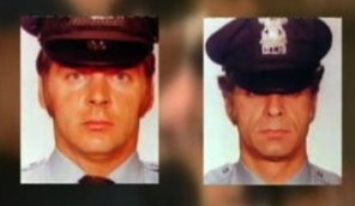
Walter Budzyn and Larry Nevers in 1992, known in community as “Starsky and Hutch.”
The Sixth Circuit ordered Nevers’ release in this opinion. He and Budzyn were later convicted of involuntary manslaughter in new trials, instead of second-degree murder, the original charge brought by the Wayne County Prosecutor.
The State of Michigan agreed at Ewing’s trial level that an evidentiary hearing would be an appropriate resolution of the jury misconduct issue, but trial Judge Carole Youngblood held that such a hearing was not necessary because the information the jury discussed had already been presented at trial.
The Sixth Circuit noted that an affidavit juror Karen Byrnes provided post-trial, “states that the jury learned of and discussed outside information about the defendant, the murder victim, and the activities and internal power-dynamics of gangs. Such information had a clear potential for tainting the jury.” (See affidavit at http://voiceofdetroit.net/wp-content/uploads/Byrnes-affidavit.compressed-2.pdf )
Dissenting Sixth Circuit Judge Karen Nelson Moore strongly disagreed with the majority, upholding Judge Hood’s ruling that Ewing should be granted a new trial because of the jury issue.
“This is a case about a district court’s discretion to fashion an equitable remedy,” Judge Moore wrote. “The facts are not complicated: Michigan violated Ewing’s due process rights when it denied him a Remmer [evidentiary] hearing. As to this all agree. The only question that remains is whether the district court’s chosen remedy—a new trial—was proper. The standard of review is abuse of discretion. The district court’s chosen remedy was within its discretion, and so I respectfully dissent.”
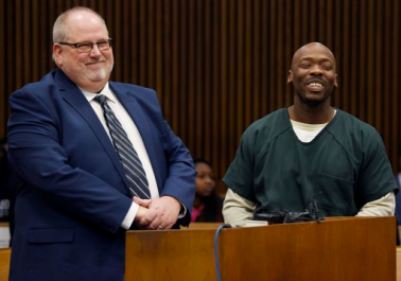
Atty. Phillip Komorski with client Michael Powels, after Judge Kelly Ramsey exonerated Powels, dismissing 2nd-degree murder charges Jan. 19, 2019 Photo: Clarence Tabb, Detroit News
She wrote later, “In this case, the district court decided that what law and justice required was a new trial. This is not beyond the pale, nor is it an unnecessary intrusion on state sovereignty. Due process requires a “sound” and “adequate” hearing, and it is entirely appropriate for the district court to have concluded that an evidentiary hearing on highly fact-specific issues conducted seven years later would have been neither sound nor adequate—assuming the necessary parties were available at all.”
Defense Attorney Phillip Comorski, who along with Attorney Byron Pitts appealed Ewing’s case to the U.S. District Court, agreed with Judge Moore’s assessment.
“It would have been better to hold a new trial,” Comorski told VOD. “How in the world can we gather all 12 jurors back together after nine years and expect them to remember what exactly happened during deliberations? In addition to memory issues with the jurors, there is the problem with locating them, and whether they are all still alive.”
He added that the hearing would be about how what the two jurors did affected the entire jury, “the point being even if it had an effect on one juror, that cuts into whether a proper unanimous verdict was given.”

Former Michigan AG Bill Schuette
Ewing’s attorneys had hoped former state Attorney General Bill Schuette would not appeal Judge Page Hood’s decision to the Sixth Circuit, but he did so. Schuette was defeated in the 2018 election by Democratic candidate Dana Nessel.
Comorski said he estimates the case will go back to Judge Page Hood in about 30 days. From there, he said, it would be referred to the state trial level for the evidentiary hearing.
Judge Carole Youngblood died unexpectedly of an aneurysm after the trial and post-conviction hearings were held. Wayne County Circuit Court Judge Cynthia Gray Hathaway was appointed to take her place.
Judge Gray-Hathaway may have a conflict in handling Ewing’s case. She allowed the defense to introduce Facebook evidence in the trial of Detroit Police Officer Joseph Weekley, accused of involuntary manslaughter in the death of Aiyana Jones, 7, during a horrific 2011 Special Response Team raid on her home.
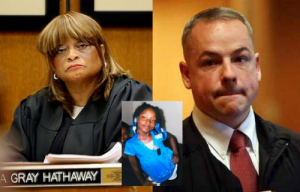
Judge Cynthia Gray Hathaway (l) dismissed all charges against killer cop Joseph Weekley (r) for shooting Aiyana Jones, 7, to death with an MP5 submachine gun in 2010.
That Facebook evidence included undated, unsourced and unrelated Facebook photos of some of Aiyana’s older relatives allegedly brandishing guns and giving gang signs. The defense even contemplated introducing a Facebook photo of Aiyana and her two little brothers giving alleged “gang signs” which signified only “east side,” as opposed to “west side.”
Although Prosecutor Robert Moran objected out of the presence of the jury, Judge Gray Hathaway allowed defense attorney Steve Fishman not only to introduce the photos, but to distribute them to the jurors for their direct viewing.
Weekley walked free after Judge Gray Hathaway granted three mis-trials.
Related:
FED. JUDGE STRIKES DOWN DARRELL EWING CONVICTION DUE TO JURY DISCUSSION OF ‘GANG’ SOCIAL MEDIA




